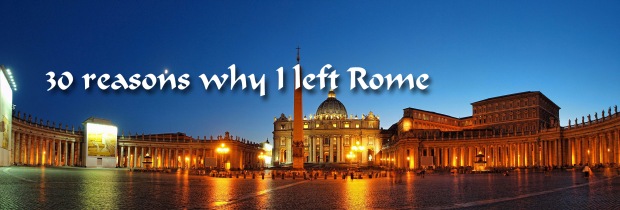Indulgences – drawing down debt
 This is No. 10 in the series. Please read my introduction and explanation here.
This is No. 10 in the series. Please read my introduction and explanation here.
When I was considering doing this month-long series on the Catholic Church, I made a list of her teachings and practices that I find erroneous or objectionable and came up with more than 30. Many of them aren’t technically a reason why I left the church because either I never really concerned myself with them as a Catholic, or they weren’t part of my personal experience. But all of them are reasons why I will never return.
Today’s disputed doctrine…indulgences…I’m sure was taught to me as an elementary school child, but it seemed to have faded into obscurity past by the time I was seriously seeking truth about God. I don’t recall it being an issue for me as an adult. It was after I left the Church, when I began reading and studying the Bible and comparing it to what Catholics believe, that I became well-acquainted with the multiplicity of beliefs and practices unique to the Catholic Church.
Indulgences must be understood against the backdrop of purgatory. The Church teaches that though Christ’s atoning work frees us from the guilt of our sin, we are still subject to “temporal punishment” for it, as contrasted with eternal punishment in hell for “grave sin.” Like missing Sunday Mass. This temporal punishment might be given while we are still on earth, but if we are not sufficiently purified when we die, we must suffer our remaining punishment in the “cleansing fire” of purgatory.
Though the idea of purgatory has been around since at least the time of Augustine in the fourth and fifth centuries, the related and mitigating doctrine of indulgences evolved much later in response to needs of the Church. In AD 853 Rome was threatened and invaded by Muslims and Pope Leo VI needed help. He promised heavenly rewards for all who would come to Rome to help defend the Church. A few centuries later, the same promises helped fill the ranks of the Crusaders.1 By the time of the Reformation, these promises were proclaimed and believed to be a reduction of time spent in purgatory, and were being bought and sold.
So an indulgence is a dispensation from the Church releasing the recipient of some or all of their purgatorial punishment, and it is acquired by performing some meritorious deed that the Church deems sufficient. She claims the right and power to absolve sin and reduce punishment because of Jesus’ promise to Peter and the apostles in Matthew 16:19 that “whatever you bind on earth shall be bound in heaven, and whatever you loose on earth shall be loosed in heaven.” But this conferring of heavenly affirmation to whatever was prohibited or permitted was given specifically to the men who would establish the foundational principles and practices of Christ’s church. Because of the Catholic Church’s claim to apostolic succession giving rise to the development of sacred Tradition, she supposes this promise applies to her today.
Bound up in this doctrine of indulgences is the Church’s teaching that in the “communion of saints,” the body of believers past and present, there exists a “treasury” of merit which can be applied to others. The idea is that the meritorious deeds and suffering of some of those who went before was much, much greater than they required for their own entrance into their heavenly home, so the excess can be withdrawn for the benefit of those with a more meager account. From the Catechism (1477): “In this way they attained their own salvation and at the same time cooperated in saving their brothers in the unity of the Mystical Body.”
This link will take you to a Primer on Indulgences at catholic.com. The author claims that, “The principles behind indulgences are as clear in Scripture as those behind more familiar doctrines, such as the Trinity.” But at most, the verses cited do no more than support the principles of sin and punishment. Support for the power to decree a remission of time spent in a fictitious, fiery furnace of temporal punishment is, frankly, as clear as mud.
I’m sure many Catholics themselves find the practice of dispensing indulgences a little odd and hard to support. But they would be wise to heed this warning found in the Primer linked above: “Indulgences are part of the Church’s infallible teaching. This means that no Catholic is at liberty to disbelieve in them. The Council of Trent stated that it ‘condemns with anathema those who say that indulgences are useless or that the Church does not have the power to grant them’(Trent, session 25, Decree on Indulgences). Trent’s anathema places indulgences in the realm of infallibly defined teaching.”
So I guess I’m cursed as well. Indulgences are useless and the Church does not have the power to grant them. “But even if we or an angel from heaven should preach to you a gospel contrary to the one we preached to you, let him be accursed.”2
1 Richard Marius, Martin Luther (Harvard University Press, 1999) pg. 131 2 Galatians 1:8




Pingback: The list | a reasonable faith
Pingback: Pope sets time frame for forgiveness | a reasonable faith